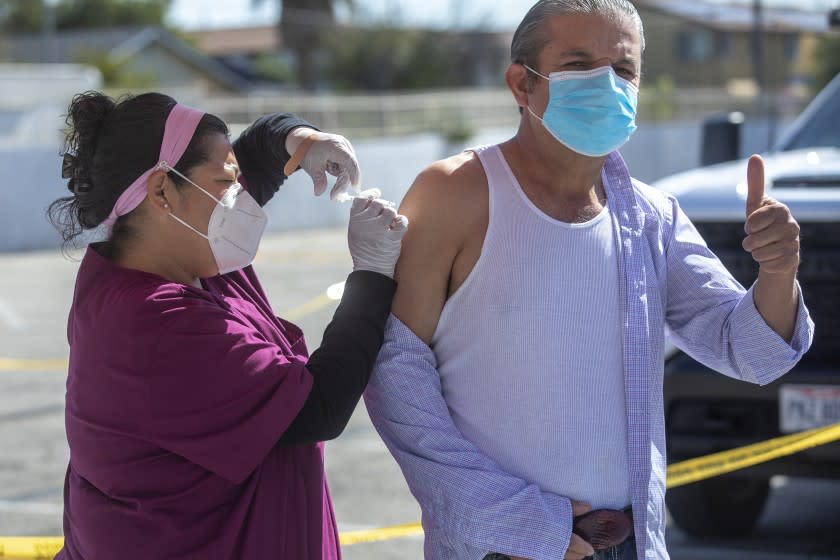
More Americans are warming up for the COVID-19 vaccines, with 19% saying they have already received at least one dose and 49% expressing the intention to do so when given the chance, according to the results of the new survey.
In all, 69% of American adults interviewed by the Pew Research Center now plan to get vaccinated. This is an increase of 60% in November and 52% in September.
Still, 15% of respondents said they “definitely” would not get the COVID-19 vaccine and another 15% said they “probably” would not get the vaccines.
Epidemiologists estimate that up to 85% of the country will need to be vaccinated to obtain collective immunity against the coronavirus. At that point, the virus will have a hard time finding new hosts to infect and the outbreak will come to an end.
Nearly 29 million Americans have had coronavirus infections, according to data compiled by Johns Hopkins University. But experts at the Centers for Disease Control and Prevention say that even those who have recovered from an infection should be vaccinated because the protection is likely to be more lasting.
More than half of respondents – 58% – said that the emergence of new variants of the coronavirus has increased the urgency for Americans to get vaccinated. Strains from South Africa and Brazil were less susceptible to vaccines in clinical trials, and others – including one that emerged in California – showed signs of vaccine resistance in laboratory tests. Health officials have also recommended vaccination as a way to anticipate more transmissible strains, such as the UK.
Black Americans, in particular, said they were concerned that new variants could undermine the country’s ability to contain the outbreak. The survey found that 68% of black adults agreed that the variants “will lead to a major setback in efforts to contain the disease”. This view was shared by only 51% of American adults in general.
In fact, the survey found that black Americans are more likely to feel personally threatened by the pandemic. For example, 35% said they were “very concerned” that they would become ill with COVID-19 and eventually need hospital care; 21% of adults in general said they felt that way. In addition, 42% of black adults said they were “very concerned” about the possibility of spreading the virus to another person without even realizing that they were infected; 30% of adults in general had this fear.
There is a basis for this heightened concern. Black Americans are significantly more likely than Americans as a whole to meet someone who died of COVID-19 or was sick enough to need hospitalization, by a margin of 78% to 67%. A report last month from the CDC’s National Center for Health Statistics found that life expectancy for black Americans dropped 2.7 years in the first half of 2020. (It also dropped 1.9 years for Latinos and 0.8 years for whites).
This may help explain the sharp increase in the percentage of black Americans who see COVID-19 vaccines as part of the solution. In February, 15% of black adults surveyed said they had received at least one dose of the vaccine, and another 47% said they “definitely” or “probably” would be vaccinated. That adds up to 62% adopting the vaccine – well above 42% in November.
While support for COVID-19 vaccines is still lower among black Americans than other racial or ethnic groups, the gap is now much narrower than it used to be.
In May, the proportion of black adults who said they would be vaccinated was 20 percentage points less than for white or Latino adults and 37 percentage points less than for Asian Americans. In February, these differences had narrowed to 8 percentage points compared to white adults, 9 percentage points compared to Latinos and 30 percentage points compared to Asian Americans.
While Americans’ views on vaccines may be converging on racial and ethnic lines, they are distancing themselves politically. In February, 83% of Democrats and those leaning towards the party said they had received at least one dose of the vaccine or intended to take it. This compares with 56% of Republicans and those who are inclined towards the Republican Party – a difference of 27 percentage points. In November, 69% of people on the left and 50% of those on the right said they intended to get vaccinated – a difference of 19 percentage points.
This party gap is also reflected in Americans’ views on the health threat posed by the coronavirus in general: 82% of leftists said the pandemic is a “major threat” to the US population, compared with 41% of those on the right.
Despite this, 66% of Republicans and Republican supporters agreed that vaccination against COVID-19 would help get the US economy back on track. That view was shared by 87% of Democrats and Democratic supporters, the survey found. Overall, 51% of American adults said that vaccination would help “a lot” and 25% said it would help “a little”.
The results are based on surveys of 10,121 adults during the third week of February.
This story originally appeared in the Los Angeles Times.
